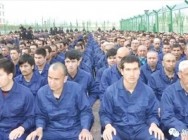Last Minute

- Conflict and Alliance: The US and China: A Centennial Dance: A Century of Relationship from 1900 to 2024
- CHINA RELATIONSEAST TURKESTAN PROBLEM AND TURKEY
- FRONTLINE China Undercover
- Elimination of “Uyghur Counter-Revolutionary Officials” in Academic Fields—Exact Quotes Translated from a Mandarin Audio File
- In Push for Trade Deal, Trump Administration Shelves Sanctions Over China’s Crackdown on Uighurs
- Dalai Lama’s 60th Anniversary Symposium: İlshat Hassan speech in English and Chinese
- Uyghur Detainees from Xinjiang ‘Placed in Nearly Every Prison’ in Shandong Province
- Shahrezad Ghayrat, Unrepresented Women
- Uighur Americans Speak Against China’s Internment Camps. Their Relatives Disappear.
- Rozinisa: The true story of the Uyghur girls in the prison

-

Conflict and Alliance: The US and China: A Centennial Dance: A Century of Relationship from 1900 to 2024
-

CHINA RELATIONSEAST TURKESTAN PROBLEM AND TURKEY
-

FRONTLINE China Undercover
-

Elimination of “Uyghur Counter-Revolutionary Officials” in Academic Fields—Exact Quotes Translated from a Mandarin Audio File
-

In Push for Trade Deal, Trump Administration Shelves Sanctions Over China’s Crackdown on Uighurs
-

Dalai Lama’s 60th Anniversary Symposium: İlshat Hassan speech in English and Chinese
Uyghur Farmer, Brothers Push Back Against Land Grab
Authorities in northwestern China’s Xinjiang region have stripped an ethnic Uyghur farmer and his brothers of their business licenses, causing loss of income from rental properties, in a bid to force them to sell their homes and vineyards at low cost to Han Chinese developers.
Located on a road leading from Yengi-Bagh village to eastern Xinjiang’s neighboring Turpan city, the properties—several groceries and restaurants—had brought in money needed to support the brothers’ families, the farmer, Abdugheni Keyyum, told RFA’s Uyghur Service in an interview.
“We can make 170,000 yuan [U.S. $27,400] to 180,000 yuan [U.S. $29,000] every year by renting them out, but five months ago they forced us to close them by confiscating our business licenses,” Keyyum said.
“They closed them without our consent,” he said.
Land-grabs by Chinese firms in Xinjiang have heightened ethnic tensions in the region, where the mostly Muslim, Turkic-speaking Uyghurs accuse Han Chinese of displacing them from their traditional homeland and depriving them of economic opportunities under strict rule by Beijing.
Village and township officials had earlier forced up to 18 other Uyghur families living in Yengi-Bagh to give up their land for less than its true value, though Han Chinese displaced by local development had been offered better deals, Keyyum said.
Only four families, including his own and those of his brothers Weli Keyyum and Kerim Keyyum, along with another family, are still resisting the takeover, he said.
Construction under way
“Construction has already begun on the land that was grabbed from the farmers,” Keyyum said, adding that village leaders and officials of Yar township, to which the village belongs, appear to be working in collusion with Chinese firms.
“We don’t know which company is doing this. When we asked, they refused to tell us, but the workers are all Chinese,” he said.
Though the market value of their property now stands at 110,000 yuan (U.S. $17,740) per square meter, with the vineyards valued at 170,000 yuan (U.S. $27,417) per mu (about one-sixth of an acre), township and village officials pressuring them to sell have offered less, he said.
“They are offering only 980 yuan [U.S. $158] per square meter per house, which is not much,” he said, adding, “They are also offering 90,500 yuan [U.S. $14,595] per mu for the vineyard.”
“We have lived here since ancient times,” Keyyum said. “We developed vineyards here, and we have the proper papers for them, but right now they are pushing us to give them up.”
Keyyum noted that with 30 people, including his family and the families of two brothers, living on the disputed land, “if they take our property away, we will have no place to go.”
“Even if they give us money for the land, it will be impossible for us to buy an apartment in which we can all fit. How will our children be able to live in the future?”
RFA was unable to contact village officials for comment.
Land acquisition for development, often resulting in lucrative property deals for local officials, sparks thousands of protests by local communities across China every month, with many of these escalating into clashes with the police.
Reported by Eset Sulaiman for RFA’s Uyghur Service. Translated by Eset Sulaiman. Written in English by Richard Finney.
http://www.rfa.org/english/news/uyghur/land-04092014152230.html
RELATED NEWS











